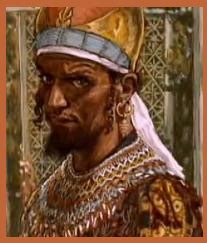The Kings of Edom
36: 31-39

The organization of the clans in Edom apparently paralleled that in Isra’el. They ultimately chose a king from one of their clans, and carried on a line of succession from him. Whether or not the line of eight kings mentioned here extends beyond the time of Jacob and Esau is unclear.548 The point is comparative; there were eight kings who reigned in Edom by the time Moses wrote Genesis (36:31a).
In most situations kingdoms were based upon family bloodlines. But this was not the case in Edom. It is interesting that the Edomite kings never became a family dynasty. When each king died, another unrelated individual ascended to the throne, probably by force of arms. The city of the new king served as Edom’s capital during his reign. You never read of a capital city of Edom because it shifted from city to city, depending on where the new king came from. These kings reigned in Edom before there was a king in Isra’el (36:31b).
Bela, son of Beor, became king of Edom. His city was named Dinhabah (36:32). The Rabbis teach that this man was the same as Balaam (Numbers 22:21 to24:25).
When Bela died, Jobab, son of Zerah from Bozrah, succeeded him as king (36:33). Bozrah will figure prominently in the Second Coming of Christ.
When Jobab died, Husham, from the land of the Temanites, succeeded him as king (36:34).
When Husham died, Hadad I son of Bedad, who defeated Midian in the country of Moab, succeeded him as king. His city was named Avith (36:35).
When Hadad I died, Samlah from Masrekah, succeeded him as king (36:36).
When Samlah died, Shaul, from Rehoboth on the river, succeeded him as king (36:37).
When Shaul died, Baal-Hanan son of Acbor succeeded him as king (36:38).
When Baal-Hanan son of Acbor died, Hadad II, who lived during the time of Moses, succeeded Baal-Hanan as king. His city was named Pau, and his wife’s name was Mehetabel, daughter of Matred, the daughter of Me-Zahab (36:39). Moses sent messengers to Hadad the king of Edom asking permission to pass through Edom, but the king refused and came out against the Israelites with a large and powerful army (Numbers 20:14-21).



Leave A Comment